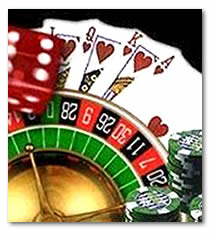Game over: Moscow to be relieved of casinos and gambling clubs
There are 56 casinos and 63,000 slot machines in Moscow now
The gambling business is flourishing in Russia nationwide. However, the people, who make their living on other people's passion for gambling, may soon experience tough days in the near future. The Russian authorities, mayors, parliamentarians, high-ranking politicians, are launching a real struggle against the gambling industry. 
The anti-gambling attack started in Russia's major cities, such as Moscow, St.Petersburg, Volgograd, etc. Municipal authorities ordered to remove numerous so-called slot game machines, known in Russia as “slot-pillars.” These machines could be seen in almost every public place: shops, market places, movie theatres, streets, and in a variety of other places, where people usually gather. The majority of such slot pillars was installed contrary to all laws and rules. Their number has already been considerably cut, at least in Moscow.
As soon as the Federal Agency for Physical Culture and Sport started controlling the gambling business in Russia, the number of casinos doubled in Moscow over only two years (to 56 casinos). The number of gambling machines reached 63,000.
The gambling business brings a certain income to local budgets. The business is also a source of considerable income to numerous criminal groups, presumably ethnic Chechen and Abkhaz groups. The criminal nature of the business and the impudent obtrusion of shady entertainment on the population literally ruins and corrupts people.
Psychologists say that Russian people have been getting more and more addicted to gambling. Zealous gamblers are ready to lose all their money in the battle with electronic slot machines. There were incidents when unlucky gamblers committed suicides after they realized their misfortune.
Games of hazard existed always - illegal casinos were open even in the Soviet Union. The situation has changed considerably since the Soviet era, though: the easy money temptation surrounds people everywhere.
Deputy chairman of the Moscow City Duma, Andrey Metelsky, believes that there should be no gambling establishments in Moscow at all. “We do not want any gambling establishments in Moscow. Russia is large, and there can be other places found for those, who wish to run this business. There is no need to do it in big cities,” the official said at a press conference.
It should be unprofitable for a businessman to keep a gambling club, a casino, or gambling machines, Andrey Metelsky believes. According to the official, license-
obtaining rules should be toughened at this point as well.
The Moscow administration unexpectedly supported the initiative to restrict the gambling business. Moscow Mayor Yury Luzhkov characterized the growing gambling industry as “total perversion and moral degradation.” Luzhkov said that he would be ready to both support and defend any radical solution of the problem, the Vedomosty newspaper said.
State Duma deputy Alexander Lebedev and his colleagues introduced a new draft law to the parliament about gambling establishments. According to the draft law, such establishments can not be located either in settlements or even on their outskirts. It is noteworthy that Boris Gryzlov, the parliament speaker, said that the document would be reviewed in the near future.
The successful start of the anti-gambling attack probably means that it has been approved in the Kremlin administration too. The efforts have already brought positive results in the Belgorod region of Russia, for example. The government of the region approved the law in 2004, which ordered to remove all casinos and gambling clubs from cities and towns of the region. Businessmen tried to set out their protests at court, but their attempt failed.
A similar practice exists in many countries of the European Union. The Moscow gambling business does look indecent against the background of other European capitals, the Vedomosti newspaper wrote. The process to pass the above-mentioned law would also be a good test for Moscow deputies. If they vote against the law, it would imply their strong corruptive ties with owners of the Moscow gambling business.
Subscribe to Pravda.Ru Telegram channel, Facebook, RSS!





